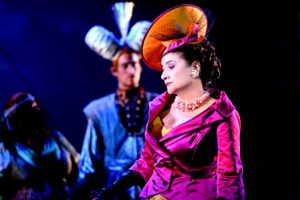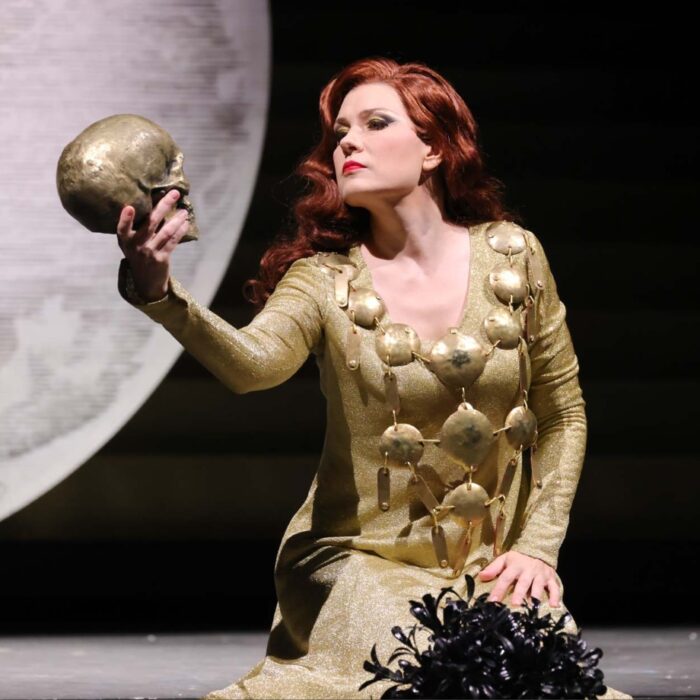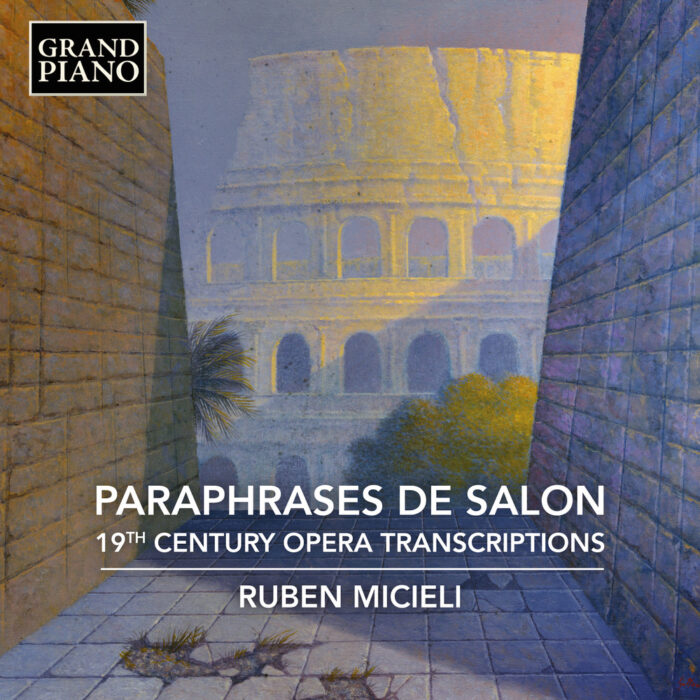
Opéra de Monte-Carlo 2021-22 Review: ‘Il Turco in Italia’
Cecilia Bartoli Succeeds in Rossini’s Rarely Performed Work
By Robert Adelson & Jacqueline Letzter(Credit: Alain Hanel)
The new production of Rossini’s “Il Turco in Italia” at the Opéra de Monte-Carlo was a symbolic bridge between the present and future of this illustrious opera house. The production’s stage director was Jean-Louis Grinda, who for the past fifteen years has also served as Director of the Opéra de Monte-Carlo, while the show’s prima donna was none other than Cecilia Bartoli, who will take over the directorship from Grinda in January 2023. The production marks the first time that Grinda and Bartoli collaborated on an opera, and the result was sensational.
Grinda’s staging focused on the poet Prosdocimo, (baritone Giovanni Romeo), who struggles to find a plot for his next libretto, so he looks around him for inspiration. At first, an oddly paired couple captures his attention. The awkward, old, and rich Don Geronio, (baritone Nicola Alaimo), is tormented by his coquettish and fickle wife Donna Fiorilla, (Bartoli), who surrounds herself with admirers and proclaims the delights of free love.
It would seem that today, the most radical and daring idea a stage director could imagine would be to allow an overture to be played before a darkened and silent house with the curtain down. Have human attention spans diminished so markedly that audiences can no longer listen intently to the orchestra for five minutes, generating a sense of expectation for what will follow? Grinda’s production of “Il Turco in Italia” was no exception to this trend. Soon after the overture began, the stage buzzes with mimed action, during which the poet invites the principal couple to a screening of a silent film they had made, in which the couple is featured as comic actors fighting it out at the dinner table. This hilarious film provides a context for the marital strains between the strong-willed Fiorilla and the exasperated Geroni and sets the stage for the unapologetically comic tone of the production.
In the first scene, at the seafront in Naples, Geronio is at his wits’ end because of his wife’s whims. He consults a gypsy fortune teller, Zaida, (mezzo-soprano Josè Maria Lo Monaco), with the poet in tow. The latter finds out that Zaida could be a useful addition to his plot because she, too, has her share of marital troubles. She is not really a gypsy, but the unjustly spurned favorite of a Turkish pasha, who now threatens to kill her out of jealousy. Thereupon, the Turk Selim himself, (bass Adrian Sâmpetrean), arrives on a boat, but no sooner has he set foot on shore that Fiorilla, who happens to be walking by, charms him.
The poet, ecstatic about this turn of events, hopes he has found the perfect way to complicate his plot, which he helps along by negotiating with the characters on how to proceed further. He is aided in this task by Albazar, portrayed by tenor Filippo Adami, who switched from his original role of Zaida’s Turkish protector to that of the poet’s assistant.
“Che bel canto! che presenza!”
What was most impressive about Bartoli’s approach to the role of Fiorilla was the infinite variety of vocal colors she possesses in all registers, and her willingness to take risks with dynamic shadings, such as letting the highest notes of a phrase emerge with a seemingly effortless pianissimo. We don’t want to lose sight of Bartoli’s abundant gifts for coloratura fireworks, which she readily displayed in such arias as “Non si dà follia maggiore (There is no greater madness)” in Act one. Her ability to infuse phrases with sparkling energy is unmatched, and her effervescent repetition of the lines “Con marito di tal fatta ecco qui come si fa (With a husband made like this, here is what you have to do)” was unforgettable. In addition to her boundless energy and abundant vocal technique, Bartoli’s acting skills allowed her to give the character a convincing depth. Fiorilla’s Act two aria “Se lo zefiro si posa (If the zephyr rests)” was both humorous and moving, and her declamatory reading of Geronio’s farewell letter was heartfelt.
Operatic characters often express precisely what the audience is thinking. In Act one, scene three, after hearing Fiorilla sing, Selim enthusiastically exclaims, “Che bel canto! che presenza! (What lovely singing! What presence!).” One could feel the collective assent of the spectators equally under the spell of Bartoli’s talents. However, even though she was clearly the star of the show, Bartoli did not dominate the production. The overall effect was rather that of a group effort performed by a cohesive cast that enjoyed singing and acting together, all of which made for a highly enjoyable performance.
Nicola Alaimo was marvelously touching and comic in the role of Geronio. His buffa patter singing was a bit rushed and imprecise at first but came into focus as the performance progressed, demonstrating that what is paramount in the rapid execution of Rossini’s syllabic writing is not so much speed but rhythmic clarity. The entire cast excelled in these patter moments, which must have been challenging to coordinate, as the singers who engaged in these quick-fire exchanges often found themselves on opposite sides of the stage, climbing a ladder or singing high atop a raised platform.
Bass Ildar Abdrazakov, originally cast in the role of Selim, had to cancel his appearance for family reasons and was replaced by Adrian Sâmpetrean. The imperturbable Sâmpetrean was a fine foil to the more forceful Bartoli and the amusing Alaimo. His contributions to the ensemble numbers were solid, with the most memorable being his Act two duo with Geronio, “D’un bell’uso di Turchia (Of a fine Turkish custom),” in which he proposes to buy Fiorilla from her husband.
During several moments in the performance, English lyric tenor Barry Banks brought down the house with laughter in his witty portrayal of Don Narciso. His Act two aria “Tu seconda il mio disegno (Sweet love further my plan),” sung after he overhears Selim maneuvering to run away with Fiorilla was a delight from start to finish, conveying both Narciso’s foppishness and his resolve to win back his love.
The production could not escape the many changes wrought by the whimsical decisions of the internationally infamous casting director named Omicron. Just before opening night, Filippo Adami replaced tenor David Astorga in the role of Albazar, while bass-baritone Giovanni Romeo ably sang the assistant.
Standout Performances in the Pit
Conductor Gianluca Capuano encouraged lively playing from the members of Les Musiciens du Prince-Monaco. Rossini’s music calls for virtuosic wind playing, and the performance highlighted the superb contributions of oboist Pier Luigi Fabretti and trumpeter Thibaud Robinne. The most difficult and outstanding solos, however, were those for the natural horn in the overture, beautifully performed by Ulrich Hübner. It was therefore a shame that the accompaniment figures in the strings covered up his virtuosity.
Perhaps Capuano’s only weakness was his reluctance to demand the kind of soft playing from his instrumentalists that the vocal soloists use quite freely and to great effect. The famous Rossini crescendos, for example, invariably began at a mezzo-forte dynamic, leaving little room to build toward an exciting climax. Admittedly, other conductors often exaggerate these crescendos, but underplaying them is a less-than-satisfactory alternative, especially for Capuano and his orchestra, who have made something of a specialty of Rossini operas in recent years.
Fortepianist Luca Quintavalle, who entertained the audience by freely improvising a running musical commentary on the text at key moments, accompanied the recitatives. At the first mention of the Turkish Prince Selim, he played the first eight measures of the overture to Mozart’s “The Abduction from the Seraglio.” In Act one, scene two, when Fiorilla asks Selim, “Quante donne amaste? Quante vorreste averne? (How many women have you loved, how many would you want to have?),” he coyly sounded the beginning of the mandolin introduction to Don Giovanni’s serenade “Deh, vieni alla finestra.” And as the curtain went up on the second act, he mischievously played the opening of Mozart’s Rondo alla Turca from his Sonata No. 11. These references remind us of the shadow cast by Mozart’s works on the European opera scene during Rossini’s time. Rossini himself parodies the music of the entrance of the Commendatore in “Don Giovanni,” to masterful comic effect when the Turkish ship arrives off the coast of Naples in “Il Turco in Italia”
Creative Excellence
Thanks to Grinda’s impeccable direction of the singers-actors, the plot advances with great animation, but the music always remained center stage. Grinda does not spend energy on arcane interpretations or on updating the plot. Instead, he creates characters who, despite their stereotypical portrayal, remain touching and likable. A conveyor belt used to transport the characters on and off stage proved to be an effective comic device, and the use of an added stretch of stage, extending in front of the orchestra, brought the singers even closer to the audience.
Rudy Sabounghi’s sets are mere curtains on which decors are projected. These include the interior of Geronio and Fiorillas’s house and the erupting Vesuvius, as seen from the beach, are visually stunning. The lighting by Laurent Castaingt is atmospheric, evoking a charming Naples at nightfall. Jorge Jara’s magnificent costumes, inspired by the Belle époque, contributed to the characters’ portrayals.
This summer, the Grinda/Bartoli “Il Turco in Italia” will head to the Wiener Staatsoper, along with a performance of Rossini’s “La Cenerentola,” also featuring Bartoli and the period-instrument orchestra, Les Musiciens du Prince-Monaco, of which she is the founder and Artistic Director.



